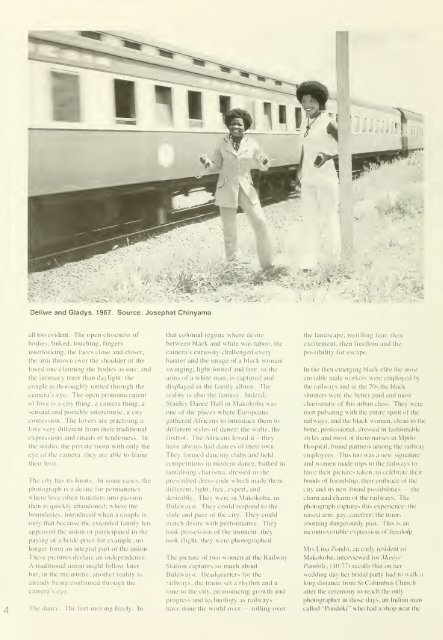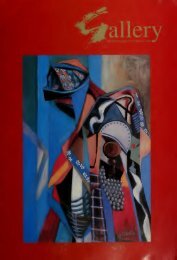Untitled - gallery delta
Untitled - gallery delta
Untitled - gallery delta
Create successful ePaper yourself
Turn your PDF publications into a flip-book with our unique Google optimized e-Paper software.
DelJwe and Gladys, 1967. Source: Josephat Chinyama<br />
all too evident. The open closeness of<br />
bodies. United, touching, fingers<br />
interlocking, the faces close and closer,<br />
the arm thrown over the shoulder of the<br />
loved one claiming the bodies as one. and<br />
the intimacy truer than daylight: the<br />
couple is thoroughly united through the<br />
camera's eye. The open pronouncement<br />
of love is a city thing, a camera thing, a<br />
sensual and portable intercourse, a city<br />
confession. The lovers are practising a<br />
love very different from their traditional<br />
expressions and rituals of tenderness. In<br />
the studio, the private room with only the<br />
eye of the camera, they arc able to frame<br />
their love.<br />
The city has its limits. In some cases, the<br />
photograph is a desire for permanency<br />
where love often transfers into passion<br />
then is quickly abandoned: where the<br />
boundaries, introduced when a couple is<br />
only that because the extended family has<br />
approved the union or participated in the<br />
paying of a bride price for example, no<br />
longer form an integral part of the union.<br />
These pictures declare an independence.<br />
A traditional union might follow later<br />
but, in the meantime, another reality is<br />
already being confirmed through the<br />
camera's eye.<br />
The dance. The feet moving freely. In<br />
-^'^yrCi\^wf^:-<br />
that colonial regime where desire<br />
between black and white was taboo, the<br />
camera's curiosity challenged every<br />
barrier and the image of a black woman<br />
swinging, light-footed and free, in the<br />
arms of a white man. is captured and<br />
displayed in the family album. The<br />
reality is also the fantasy. Indeed.<br />
Stanley Dance Hall in Makokoba was<br />
one of the places where Europeans<br />
gathered Africans to introduce them to<br />
different styles of dance: the waltz, the<br />
foxtrot. The Africans loved it - they<br />
have always had dances of their own.<br />
They fonned dancing clubs and held<br />
competitions in modern dance, bathed in<br />
tantalising charisma, dressed in the<br />
prescribed dress code which made them<br />
different, light, free, expert, and<br />
desirable. They were in Makokoba, in<br />
Bulawayo. They could respond to the<br />
slide and pace of the city. They could<br />
match desire with performance. They<br />
took possession of the moment, they<br />
took flight, they were photographed.<br />
The picture of twi) women at the Railway<br />
Station captures so much about<br />
Bulawayo. Headquarters for the<br />
railways, the trains set a rhythm and a<br />
tone to the city, pronouncing growth and<br />
progress and technology as railways<br />
have done the world over — rolling over<br />
the landscape, instilling fear, then<br />
excitement, then freedom and the<br />
possibility for escape.<br />
In the then emerging black elite the most<br />
enviable male workers were employed by<br />
the railways and in the 70s the black<br />
shunters were the better paid and most<br />
..^<br />
charismatic of this urban class. They were<br />
men pulsating with the entire spirit of the<br />
railways, and the black women, clean to the<br />
bone, professional, dressed in fashionable<br />
styles and most of them nurses at Mpilo<br />
Hospital, found partners among the railway<br />
employees. This too was a new signature<br />
and women made trips to the railways to<br />
have their pictures taken, to celebrate their<br />
bonds of friendship, their embrace of the<br />
city and its new found possibilities — the<br />
chum and charm of the railways. The<br />
photograph captures this experience: the<br />
raised arm. gay. carefree: the trains<br />
zooming dangerously past. This is an<br />
incontroveiliblc expression of freedot\i.<br />
Mrs Lina Zondo. an early resident of<br />
Makokoba. interviewed for Mcisiyi'<br />
Panibile, ( 10:77) recalls that on her<br />
wedding day her bridal party had to walk a<br />
long distance from St Columbus Church<br />
after the ceremony to reach the onl\<br />
photographer in those days, an Indian man<br />
called "Pondoki" who had a shop ne.ir the







